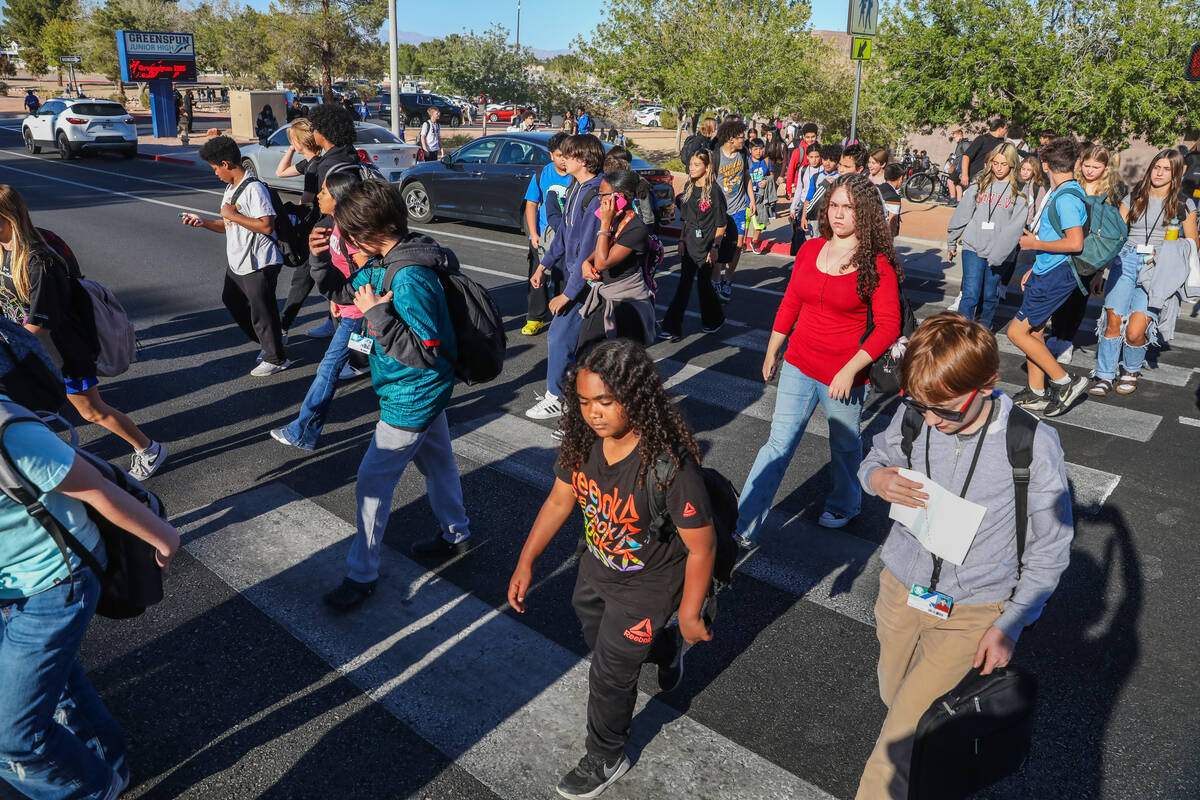School’s back in session; all road users should pay attention

Monday kicks off another school year in Clark County, and that means children will be making their way to and from school in a variety of ways and school zones will again be in effect during the morning and afternoon.
All residents need to take notice to ensure the safety of all children during the daily commutes to school. School zones are in effect 30 minutes before and after school, or while children are present, with rules that differ from usual driving periods.
U-turns are not allowed within a school zone and speed limits are reduced from their regular rate, to either 15 mph or 25 mph, depending on a school’s surroundings.
Last year there were 138 reports of children being hit by vehicles walking to and from schools in the Clark County School District. Pedestrian-vehicle injuries are a leading cause of death among children between the ages of 5 and 14, according to the National Library of Medicine.
“This is the time of year where I beg, plead and I ask in every way I know how for residents of Southern Nevada to focus on their surroundings as we start another school year,” Clark County Commissioner Michael Naft said, last week during a phone interview. “We have kids back in our community.”
Everyone in the community plays a role in ensuring traffic safety, from law enforcement, crossing guards, engineers and the individuals who are commuting, Naft said. Everyone working together, using safe commuting practices, is the best way to prevent crashes from occurring, he said.
“This isn’t some intangible problem,” Naft said. “This is a trend in the wrong direction in kids getting injured to and from school. It’s also a problem we can do something about with a little bit of extra time and an increase in respect for one another.”
Middle school crossing guards
This school year marks a milestone for several areas in the Las Vegas Valley, as schools in Clark County, Henderson and North Las Vegas will have official CCSD crossing guards stationed at middle schools in those areas.
A 2022 Las Vegas Review-Journal investigation revealed that middle school-aged students were the most likely to be involved in a crash near schools. They accounted for nearly half of the injuries identified in a Review-Journal data analysis, despite only making up 25 percent of CCSD’s total enrollment.
That this year will be the first school year that crossing guards will be used at Las Vegas Valley middle schools is a monumental moment, said Naft, who also helped start the county’s Office of Traffic Safety and pushed to add crossing guards at middle schools, which gets the ball rolling for other jurisdictions to follow suit.
“This is the first, first day of school with crossing guards at middle schools,” Naft said. “All of the data suggests that is a critical part of saving lives and preventing injury in our community. Having extra eyes, hands and individuals on our roadways, helping look out for everyone’s safety.”
Increasing the number of crossing guards is a win-win for all involved, as they also help children learn proper pedestrian safety habits, according to Anita Pepper, spokeswoman for the Nevada Department of Public Safety.
“They’re there to remind drivers that there are pedestrians, so they help navigate the space between driver and pedestrian,” Pepper said during a phone interview last week. “They are also good at helping the children develop good pedestrian habits.”
Safety education
Just as parents and caretakers give their children advice to do well in school, such as going to bed earlier than during the summer and making sure they turn their homework in on time, they should also remind them about safety procedures of traveling to-and-from school each day.
“Making sure that they’re walking in the crosswalk, that they’re walking with the traffic signal and making sure that they’re walking their bikes in crosswalks,” Pepper said. “Also make sure they’re not distracted while crossing the street.”
Parents and other motorists who will make their way through a school zone during their morning and afternoon commutes should also plan ahead, knowing it could take a little longer than they’ve become accustomed to during the summer break.
“Drivers should remember that there is going to be more congestion on the road as everyone is going back to school,” Pepper said. “The first thing they should do is allow themselves more time for the school drop offs, so that they’re not rushing, or feeling the need for speed. Always give yourself a buffer to get there.”
Drivers should follow the drop off procedures of their child’s school, obey the traffic laws and be aware of other vehicles and children.
Being safe around buses is also a must, as children can be unpredictable when unloading from buses, especially in the excitement of getting out of school for the day.
“If they see that a bus is stopped, they should stop, too,” Pepper said of drivers. “They should be aware that yellow flashing lights means that a bus is preparing to stop, or if a bus has a stop arm out, that means they are about to load or unload children, so cars should stop their vehicles.”
Parents should also remind their children to use caution when leaving a bus, not to dart out into the street after exiting and to listen to directions of school bus drivers, Pepper said.
For students who ride their bikes to school, parents should ensure that they wear a helmet.
“Please wear a helmet and make sure the helmet fits correctly,” Pepper said. “Cyclists should pay attention to cars as it’s important to remember if there is an incident between a bicycle and a car, it’s the person on the bicycle that is much more vulnerable.”
Contact Mick Akers at makers@reviewjournal.com or 702-387-2920. Follow @mickakers on X. Send questions and comments to roadwarrior@reviewjournal.com.